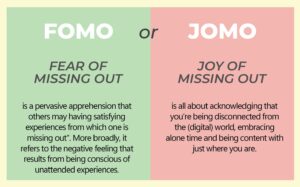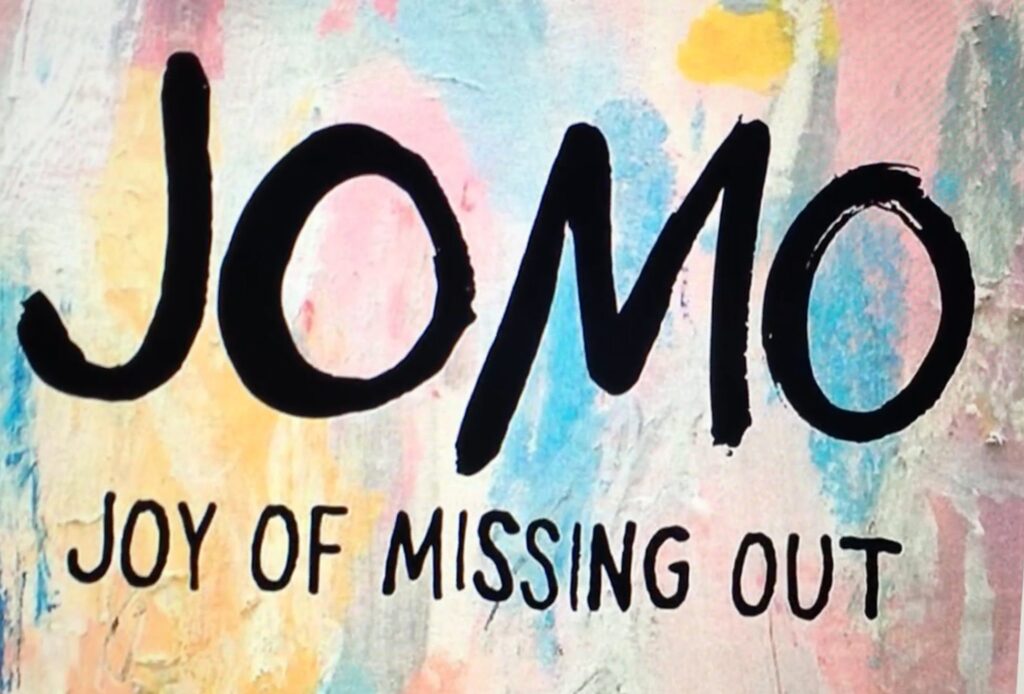Mental Wellbeing, Mindset, social
Finding the Joy of Missing Out (JOMO)
How can we switch from fear to joy and embrace the Joy Of Missing Out?
It’s easy to see the explosion of exciting workshops, classes, socials and weekenders both in the UK and further afield and feel like there is so much we are missing out on.
Regardless of the reason.
We can feel envy, resentment, left out, fear, anxiety, frustration and sometimes even anger at not doing ALL the wonderful things in our creative West Coast Swing Community.
That unwelcome housemate of self doubt and imposter syndrome can even unkindly suggest if only you went you’d be ‘enough’. (Don’t listen, it’s being a word I can’t politely write here, and there’s a whole separate article coming on how to tame this particular part of ourselves).
Perhaps the worst side of this is we can very much feel a fear of missing out (FOMO) and sometimes even become unkind to others who did go to the event and posted all the fun photos, and got the medals, and found the new friends.
Sucks, doesn’t it?
But there is a solution, and it requires a little mindset shift and smidge of gentle repeat practice to totally change how we feel.
Within a very short time we can move from Fear to Joy.
What is JOMO?
Goos question. JOMO is the Joy of Missing Out and it is exactly that. With some subtle shifts we can feel joy at not attending. We can feel grateful for the space to do other things, to learn and grow in other ways, and even shift to feeling genuinely excited to hear about the events we didn’t attend from our friends. We can even celebrate their wins, experiences and happiness without any sinking feelings of inauthenticity or trying to hide our sadness.
Yup we really can

Sitting with the feelings
We could skip straight to how we create JOMO, but honestly I’ve tried that and sooner or later we need to understand WHY we feel FOMO and all the other associated feelings.
*side note, if you’ve not Read Brené Brown’s ‘Atlas of the Heart’ we highly recommend buying the book, making notes, bookmarking your fav pages and doing an old fashions book club evening on it with friends and family. It’s going to really help with this step*
Do you know why those feelings of frustration, sadness and anger are showing up?
Our feelings are messengers. They help us navigate the world, inform us on things we are subconsciously thinking and observing and let us know when our needs and boundaries are being met or ignored.
It’s important to acknowledge all our feelings without growing in them. Even joy can overwhelm us and become problematic if it is the only thing we can be aware of.
Notice when the feelings come up.
Ask why they are there.
What need sits under them? How else can we meet that need and release this emotion? (I find this image from Atlas of the Heart, immensely helpful)

Invite critical comparison to leave and never ever come back
Yes. Let is go.
Let the habit die.
Critical comparison looks to find the negative. It beats us up, blames us and others for a falsely perceived lack and allows us to become mean, hurt and resentful. It is the sword our imposter syndrome wields to get us in line, and absolutely is something I’d invite you to throw away and never allow back into your mind again.
Helpful, curious and playful comparison is a tool of a growth mindset. It is noticing differences that we want to be curious about and learn from – that we can very much keep and foster.
The ‘What can I learn’ mindset is going to help us want to ask about the things we didn’t attend and learn if next time we want to choose that event or not.
How to invite the JOMO in

Now we know our needs, have a little curiosity and shed those unhelpful critique critters from us (be wary they like to sneak back in without telling us), we are ready to switch gears from fear to joy!
The first few times we might need a little help getting into this space.
Put on your fav fun music. The one you sing your heart out to in the car, or dance like a loon to in the kitchen without a care in the world.
Or sit in ‘your spot’ you know the one you go to when you need quiet. The one you don’t tell ANYONE about so it can be just yours.
However you do it, help your mind and body feel relaxed, comfortable and safe.
Think of things that bring you Joy.
Where does that feeling sit in your body? what smells, colours, thoughts accompany it?
For those who can’t visualise, write down things you know bring you joy, be specific.
Next up, list the ‘I get to’s’ and ‘I choose to’s’. Because I’m not at this workshop, I get to spend time with my family, who I haven’t seen in a long time.
By not going to that freestyle, I get to have a long sleep, recover my energy and start that DIY project that’s been on hold for months.
I chose to not go to the event, so I can be rested and ready for the weekender next weekend. By resting this weekend, I’ll get to really enjoy catching up with dane friends, being away from home and really appreciate ALL the dancing on offer.
I didn’t know about that event, looks like John Smith went, I can’t wait to hear his experience of it to see if I’d like to go next time. It’s great he’s testing it out whilst I get to, journal, meditate, go out with my non-dance friends….
See the pattern?
We can’t physically attend everything.
We have to choose.
Even if we had a TARDIS and a magic money tree making it physically possible, if we went to every single event/ class/ workshop/ weekend, and never did anything but West Coast Swing we’d easily burn out.
We wouldn’t be able to fully appreciate the learning, the energy, or the experience of what it was we were doing.
We’d risk our dance would risk becoming stagnant, low energy or even routine.
There is a very low probability that we could be fully present with our connection to our creative selves and our dance partners.
To be at our best, we need variety, rest and other aspects of our being to make us a well rounded and healthy dancer.
Even olympic athletes have on and off seasons. They factor in rest days with as much importance and focus as training days.
Appreciating what time away from dance gives us helps us fully enjoy and appreciate what we do choose to attend.
In Summary:
We’ve covered quite a lot above. Some of it can become very deep work, or be a gentle regular practice. In summary here are the key steps:
- Notice what feelings come up with FOMO. Write them down, talk to them. Ask why they come up and what need you have that is currently unmet
- Step into joy – play music, is t quietly, dance in the kitchen, find it and let it in
- Ask ‘What does not attending give me?’ write down or at least acknowledge the’ by not going to the event I get to……..’
- Practice steps 1-3
- Get curious. Ask others about the things you didn’t attend. Use that growth mindset to help you know if the next one is worth you choosing or not? (we mentioned this mid way through the article, it is the boss level step, only do it when you are ready)
I hope this helps you embrace the JOMO. I’m definitely on path with learning JOMO and by no means fully there yet, but it is quite freeing when you do embrace the joy!
Side notes:
If this post or any of the others on the website has brought up anything you’d like to share, ask about or need help with please do reach out.
If you have something to add, or a new way to wellbeing that you’ve found helpful to you we always want to know more. Please let us know and you can write a blog post, do an interview or tell us what you want sharing and we’ll put it out there anonymously for you if you prefer.
We believe community is the catalyst for grown, and together we can achieve so much much more than on our own, so please do share! After all a singular perspective is never a full view 🙂

